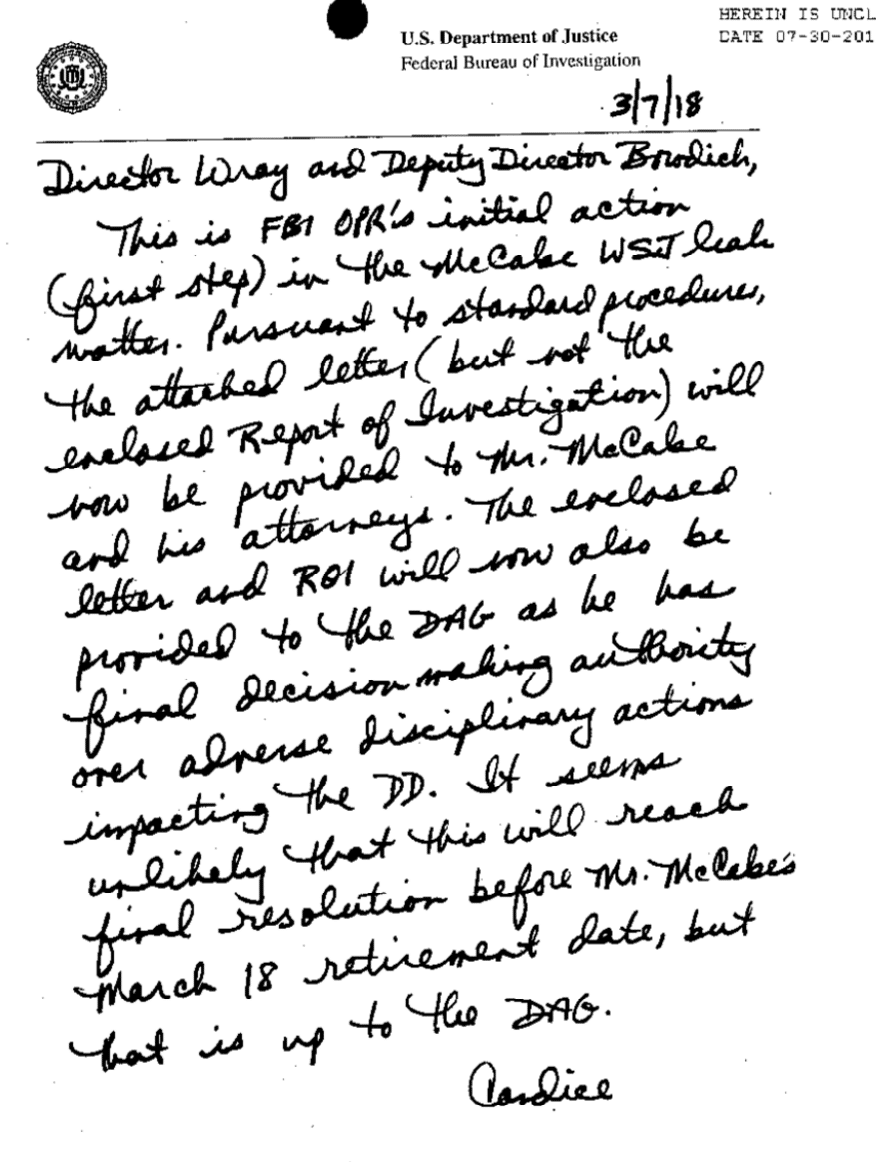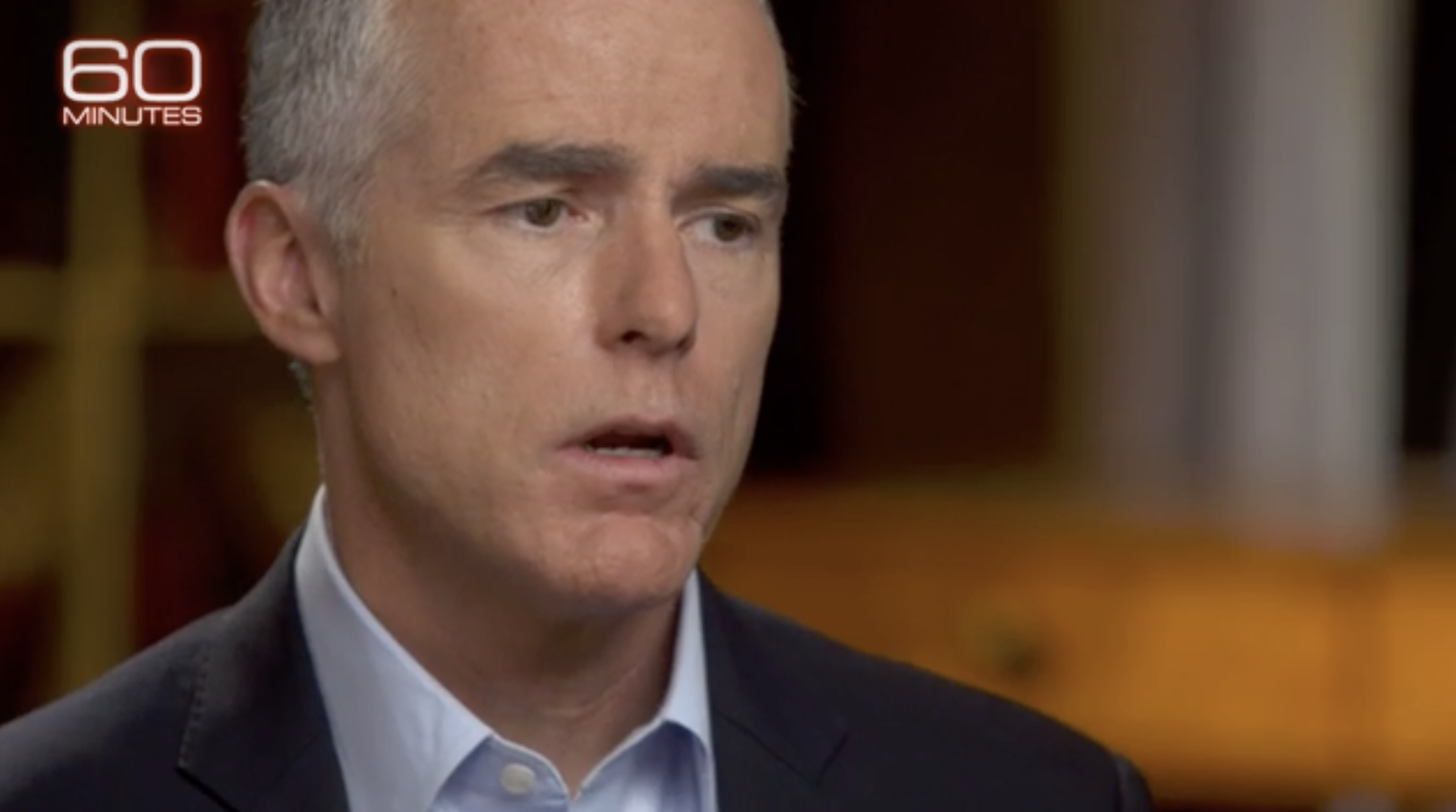When Merrick Garland appointed Robert Hur to spend a year reading through Joe Biden’s diaries, he emphasized that Hur was a career prosecutor, even while describing the role his appointee had played as Rod Rosenstein’s Principal Associate Deputy Attorney General (PADAG) and then as a Trump-nominated, Senate-confirmed, US Attorney.
Mr. Hur has a long and distinguished career as a prosecutor. In 2003, he joined the Department’s Criminal Division, where he worked on counterterrorism, corporate fraud, and appellate matters. From 2007 until 2014, Mr. Hur served as an Assistant U.S. Attorney for the District of Maryland, where he prosecuted matters ranging from violent crime to financial fraud. In 2017, Mr. Hur rejoined the Department as the Principal Associate Deputy Attorney General. In 2018, he was nominated and confirmed to serve as the U.S. Attorney for the District of Maryland. As U.S. Attorney, he supervised some of the Department’s more important national security, public corruption, and other high-profile matters. [my emphasis]
In my opinion, the vast majority of Merrick Garland’s critics mistake this — Garland’s naive belief in the good faith of people who have been DOJ employees — for a kind of caution or partisanship. Garland simply believes, I think, that something about working for DOJ rubs off on people and stays there, even the people who did scandalous things during Trump’s term. This is not the only time that faith has or could result in really grave consequences for DOJ’s ability to hold people accountable.
The problem is, with Hur, Garland should have known better, and not just because Hur was obviously a senior member of Trump’s DOJ.
At the end of last week’s Jack podcast (YouTube; Simplecast), Allison Gill and Andrew McCabe discussed the role Hur played in Trump’s DOJ. Gill replayed McCabe’s warnings, a year ago when Hur was appointed, about the former PADAG’s willingness to engage in politics. McCabe pointed to Hur’s role in imposing limits on the Mueller investigation (to which, I’ve noted, Hur didn’t adhere in this review) and participation in a gang arrest press conference staged at the White House, breaching the separation between the White House and DOJ.
But Hur had a more specific role in carrying out a partisan hit job for Trump.
Just after 1:02 on the podcast, in the stuff recorded last week, McCabe described that Hur played a key role in, “overriding the process that I was entitled to and basically accelerating the decision to fire me in an effort to get it done before I could retire.” McCabe claimed that Hur violated his due process to fulfill Trump’s demands to fire the former FBI Deputy Director rather than let him retire on schedule.
As laid out in McCabe’s 2019 lawsuit against DOJ, for months leading up to McCabe’s firing, Trump had been complaining that DOJ hadn’t fired him yet. Against that background, on March 5, 2018, FBI and DOJ started the process of using DOJ IG’s problematic report finding that McCabe lacked candor about serving as a source for one of Devlin Barrett’s biennial right wing hit jobs as an excuse to fire him. Time was short. They had less than two weeks to do that before McCabe’s designated retirement date (depending on how you calculate it, any of the days from March 16 and 19, inclusive).
The process started with Candice Will, the head of FBI’s Office of Professional Responsibility, preparing a recommendation to fire him.
After some discussion on March 5 about whether, in response to McCabe attorney Michael Bromwich’s request, McCabe’s team should get a copy of the IG Report in advance so as to have more time to respond, Will laid out, in a handwritten note sent March 7, that she would send just the letter reporting DOJ IG’s referral, but not the report, to Bromwich. Without saying it directly, Will was signaling she was not going to give Bromwich any extra time to respond.
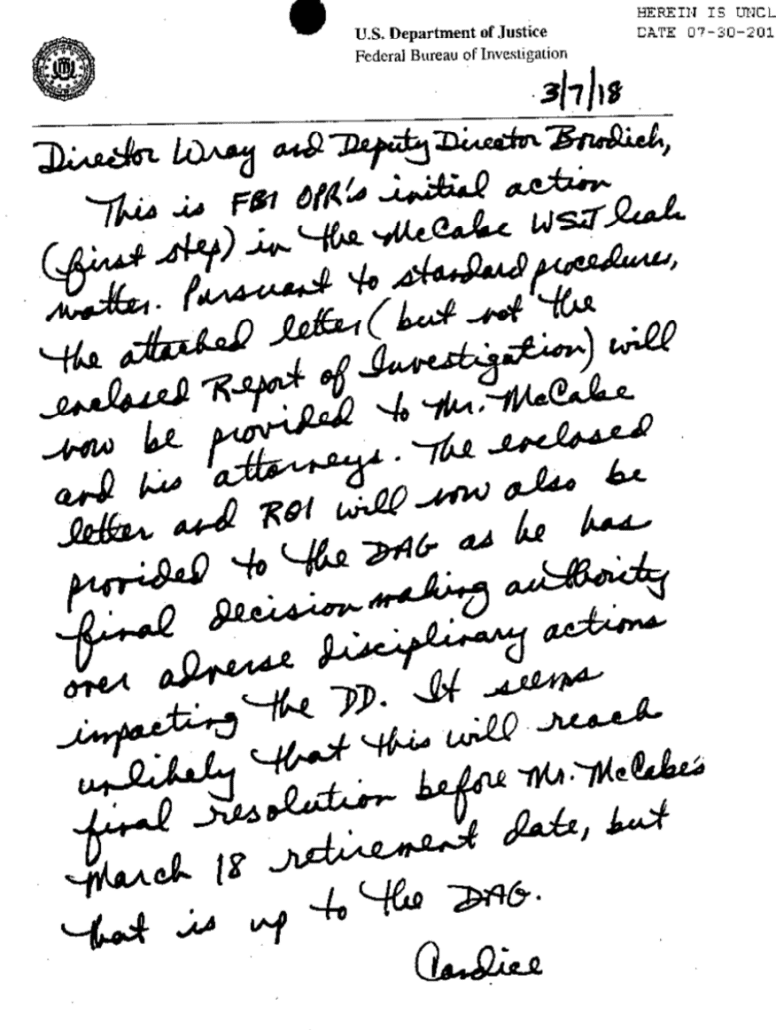
That same note made it clear that without intervention from DAG — Rod Rosenstein’s office — “it seems unlikely that this will reach final resolution before Mr. McCabe’s March 18 retirement date.” Those rushing to fire McCabe before his retirement recognized on March 7 that the only way they could fire McCabe before he retired was via Rosenstein’s involvement.
The same morning Will explained that they couldn’t manage to fire McCabe before he retired without intervention from Rosenstein’s office, she sent Hur an email asking to speak to him on the phone, “about a matter being forwarded to the DAG?” Remember: at this point, Hur was Rosenstein’s top deputy.
Hur and Will spoke that evening.
Will’s notes from that conversation were, when released via FOIA, almost entirely redacted under a deliberative privilege. They appear to memorialize what happened at a meeting between Hur, Rosenstein, and Scott Schools that day. Schools, the senior career Associate Deputy Attorney General at the time, played a role in DOJ that was always supposed to ensure ethics; in that role, he oversaw the review process leading up to McCabe’s termination.
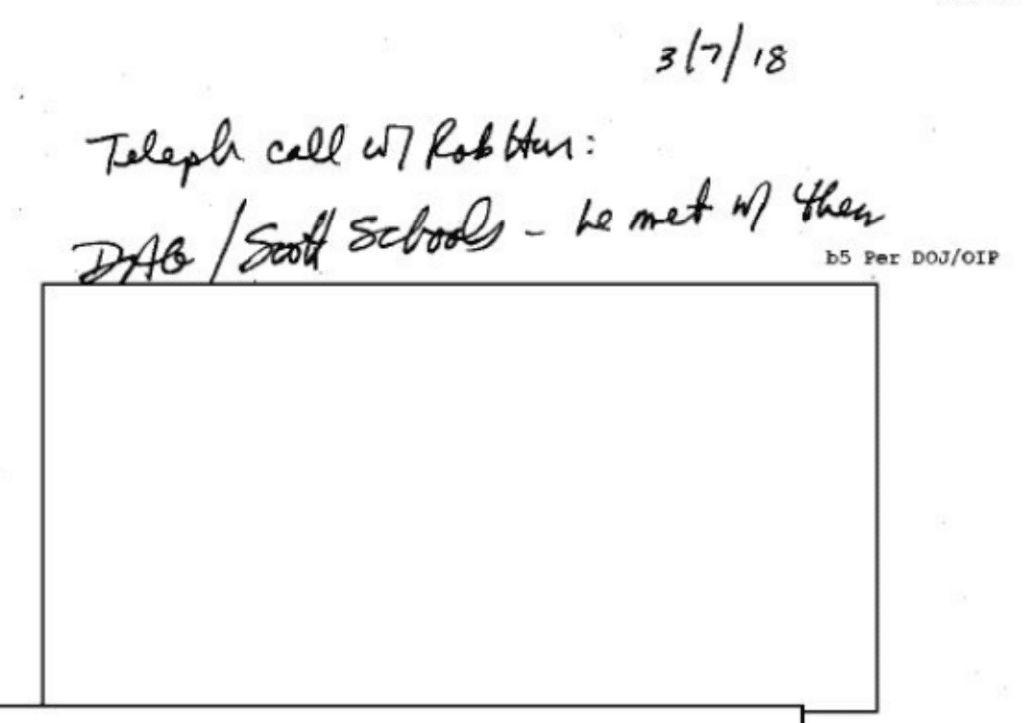
An email thread documenting how OLC head Steven Engel interpreted the SES guidelines on firing, which Hur then forwarded to Schools, who forwarded it to Will, likewise remains heavily redacted under b5 deliberative exemptions.
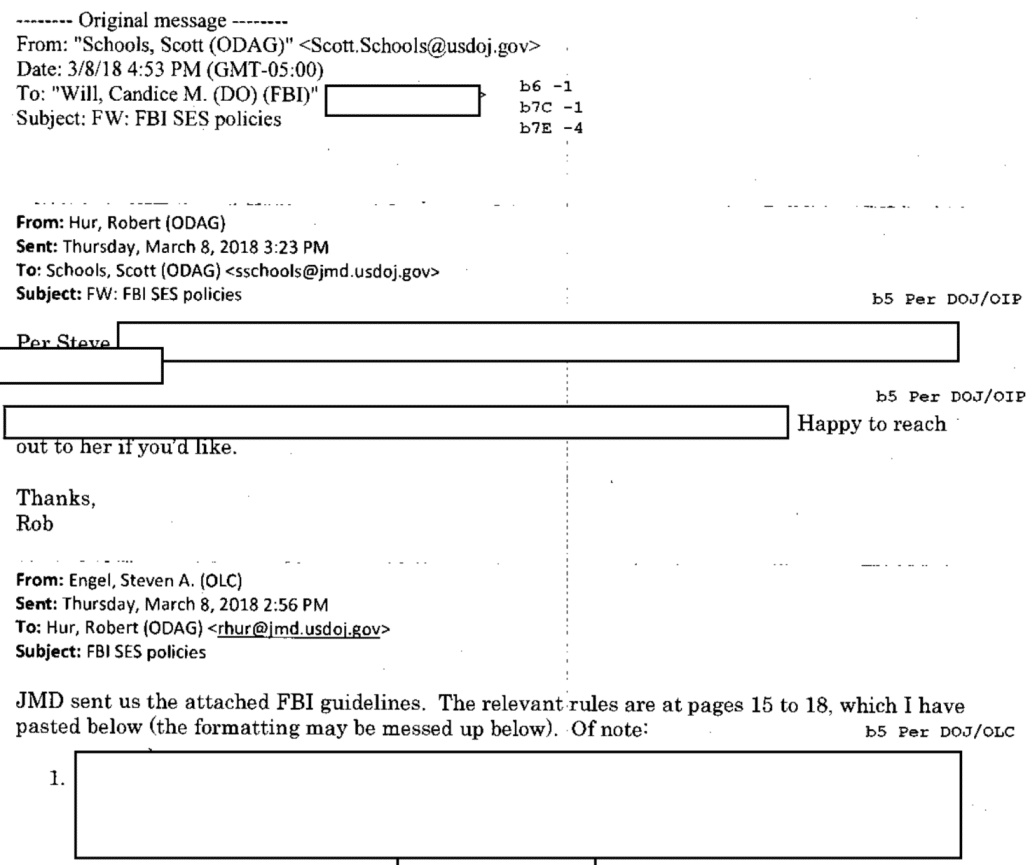
Those documents — what Robert Hur told Will on March 7, 2018 and how Steven Engel spun guidelines mapping out what kind of due process senior employees get before you can fire them — are among the records that McCabe would have gotten in discovery if DOJ hadn’t settled the lawsuit.
DOJ redacted less of the emails showing that Will kept Schools and, at times, Hur, informed of how Michael Bromwich frantically tried to review the entire case file in time to mount a legal challenge, but even there, there are deliberative discussions withheld from release.
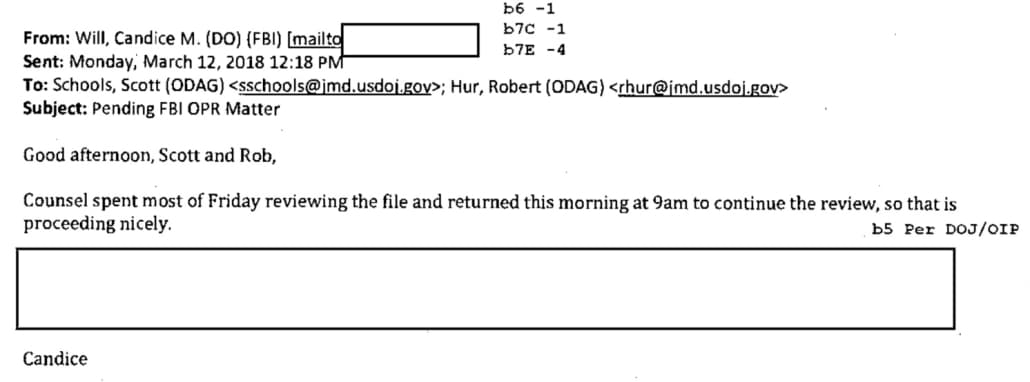
One thing is clear: with each request Bromwich made, DOJ took days to respond.
In the lawsuit, McCabe’s lawyers noted that Bromwich wasn’t given emails and statements involving FBI’s press person, Michael Korten, that the DOJ IG had ignored — emails that were exculpatory — until the day before Bromwich had to present McCabe’s case to Schools.
Certainly, Andrew McCabe has reason to be biased against Robert Hur, because Hur was part of a team that forced McCabe to fight for years just to get a pension earned over decades.
But you don’t have to take McCabe’s word that Hur played a part in, “overriding the process that I was entitled to and basically accelerating the decision to fire me in an effort to get it done before I could retire.”
Take Merrick Garland’s word on what happened. In response to a question from Chuck Grassley shortly after the settlement, Garland explained why career lawyers at DOJ said they should settle: because they were going to lose the case.
The case … involved a claim that he was not given amount of time necessary to respond to allegations and the litigators concluded that they needed to settle the case because of the likelihood of loss on the merits of that claim.
Garland delivered this heavily rehearsed (and inaccurate — that’s not the only thing included in the suit) statement, explaining that the team that rushed to fire McCabe so they could take his pension had not given McCabe the amount of time required to respond to the allegations against him, on October 27, 2021, over a year before he named one member of that team that deprived McCabe of his due process to lead an investigation into Joe Biden.
Garland was clearly just repeating a well-rehearsed answer in this response to Grassley. It’s unlikely he reviewed the matter closely enough to know that Hur was one of the people, according to the career attorneys who said DOJ would lose the suit, who deprived Andrew McCabe of due process. Though Garland knows how DOJ works. He should have known the universe of people who might be involved.
Given how politically contentious the decision to settle was, however, it is also virtually certain that people in Lisa Monaco’s office did review the details closely. In fact, traditionally, the person who would review matters that — like this one — involve weighing ethical considerations and the potential of a big black eye for DOJ is the career Associate Deputy Attorney General, the successor to Scott Schools, who was involved in the firing.
In July 2018, Jeff Sessions appointed Bradley Weinsheimer as Schools’ successor.
It would be shocking if Weinsheimer didn’t review the decision to settle the McCabe lawsuit.
But if he did, that would be cause for further concern. That’s because Weinsheimer is the guy who rejected complaints from Biden’s attorneys about Hur’s politicized attacks on Biden.
By settling Andrew McCabe’s lawsuit, DOJ conceded that Robert Hur and others had deprived the former FBI Deputy Director of due process. They violated DOJ’s rules to do Trump’s bidding. Then, DOJ put Hur in charge of an investigation of Joe Biden.


